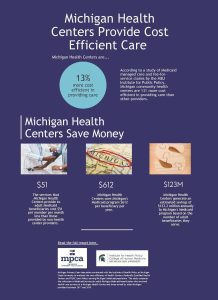LANSING—Michigan community health centers, also known as Federally Qualified Health Centers and FQHC Look-Alikes, are 13 percent more cost efficient at providing services to adult Medicaid beneficiaries than non-FQHC providers, according to an evaluation of Medicaid managed care and fee-for-service claims between 2017 and 2019. Executive Summary I Full Report
The Michigan Primary Care Association (MPCA) commissioned the Institute for Health Policy (IHP) at Michigan State University to conduct the evaluation. Read the full study here.
The results–a follow-up to a similar study by IHP written eight years ago–are presented in the report “An Evaluation of the Cost Effectiveness of Federally Qualified Health Centers (FQHCs) and FQHC ‘Look Alikes’ Operating in Michigan.”
 The report demonstrates that Michigan’s health centers save the state of Michigan $51 per member per month (up from $12 in 2014), or $612 per beneficiary per year (up from $144 in 2014) in Medicaid expenditures. Based on the number of adult Medicaid patients Michigan FQHCs serve, health centers generate an estimated savings of $123.2 million per year to the Michigan Medicaid program.
The report demonstrates that Michigan’s health centers save the state of Michigan $51 per member per month (up from $12 in 2014), or $612 per beneficiary per year (up from $144 in 2014) in Medicaid expenditures. Based on the number of adult Medicaid patients Michigan FQHCs serve, health centers generate an estimated savings of $123.2 million per year to the Michigan Medicaid program.
“This study is valuable as it helps us to understand the impact Michigan community health centers have on the health and well-being of Michiganders, as well as the economic impact on the state’s health care system,” said MPCA CEO Phillip Bergquist.
Generally, the lower costs of health center services are due to reduced utilization of more expensive Medicaid services, such as inpatient hospital services. In fact, the study revealed that average hospital in-patient stays for FQHCs were 9.42 days compared to 13.2 for non-FQHC patients. This is likely attributable to health center patients using their local health center as their chief source of primary and preventive care.
IHP’s evaluation compares the utilization of Medicaid services, as well as the total cost of services, by adult (18-64 years) Michigan Medicaid beneficiaries who received primary health care services at a Michigan health center during the two-year study period with those served by non-FQHCs.
FQHC patients are those that have received at least two qualifying primary care visits at a Michigan health center during the study period. Non-FQHC patients are those that did not receive at least two primary care visits at a Michigan health center during the study period.
In the Medicaid and Healthy Michigan Plan programs, health centers are paid through a Prospective Payment System (PPS) which uses a single bundled payment to reimburse multiple services provided in the same patient encounter. (Health centers’ PPS payment rates were included in calculating health center costs of care in this study.) The PPS was established by federal law in 2001 to ensure health centers receive payment for the comprehensive nature of their services and to prevent the small amount of federal grant funding received by most health centers to care for the uninsured from being diverted to cover shortfalls in Medicaid reimbursement.
However, over the last two decades, Medicaid PPS payment rates have not kept pace with the cost of delivering high-quality care. In fact, research completed by Health Management Associates in 2021 indicates that, on average, Michigan health centers are paid $61.00 less per Medicaid patient encounter than the cost of delivering those services. Health centers continued cost-effectiveness and significant annual savings generated for the Medicaid program support making future investments to ensure payment to health centers is sufficient and innovative payment reform can be pursued.
Community health center services are available to everyone, regardless of insurance status or income level. The study further demonstrates that when health centers are adequately reimbursed for providing Medicaid services, funding is available to help cover the costs of caring for the uninsured.
Today, 40 community health centers and four Native American health service providers provide quality, affordable, comprehensive health care to more than 720,000 Michiganders through 370 delivery sites in rural and urban communities across Michigan.
-30-
CONTACTS: Tom Kochheiser 517.230.9829; Patrick Stewart 517.827.0884
